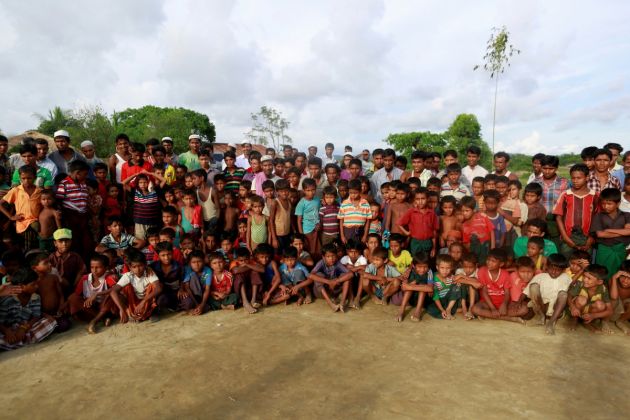Pope Francis urges respect for all Myanmar's ethnic groups, without using the 'R' word

Pope Francis has told Myanmar's leaders in the capital Naypyidaw to leave conflict behind and work for peace by promoting justice and respect for the rights of all citizens, regardless of religion or ethnicity.
"The arduous process of peace-building and national reconciliation can only advance through a commitment to justice and respect for human rights," the Pope told Myanmar civil authorities Nov. 28, Catholic News Agency reports.
Francis called for respect for rights and justice, but refrained from any mention of the Rohingya, or allegations of ethnic cleansing that has driven huge numbers of the Muslim minority from the country, AFP reported.
Pope Francis did not openly challenge the Myanmar authorities on the atrocities that have taken place in their predominantly Buddhist country against the Muslim minority Rohingyas from the Northern Rakhine state.
The pontiff is visiting Myanmar and Bangladesh and in choosing his words he would have been considering the implications they might have for the future of the tiny Catholic minority in the country.
He will be in Myanmar Nov. 27-30, and will visit two cities before moving on to Dhaka, Bangladesh, where he will stay Nov. 30-Dec. 2.
There are 400,000 Catholics in Bangladesh out of a population of 163 million, while in Myanmar there are 700,000 Catholics in a population of 53 million.
In Bangladesh the Pope is expected to meet some Rohingya refugees.
Pope Francis began his first full day in Myanmar an unscheduled encounter at the Archbishop's House, meeting with a group of 17 leaders from the different religious traditions present in the country.
When he shared the stage with Myanmar's leader Aung San Suu Kyi in Naypyidaw, he did not address the Rohingya crisis head-on, instead tip-toeing around the unfolding humanitarian emergency.
SUU KYI
Suu Kyi also did not refer to the Rohingya's in her speech, but said the Pope's blessing will be shared by everyone in Burma as they seek to spread "goodwill and joy" throughout the nation, CAN reported.
Myanmar's leaders "will strive to discharge our duties with probity and humility," she said.
She noted, "We wish to leave to the future a people united and at peace, secure in their capacity to grow and prosper in a changing world; a compassionate and generous people, always ready to hold out a helping hand to those in need; a people strong in skills and whole in spirit."
"The road ahead is long," she said, "but we will walk it with confidence, trusting in the power of peace, love and joy."
Vatican Radio reported that in her words to the Pope, Suu Kyi talked directly of the challenges in Rakhine state, which has been the focus of such intense criticism from the international community and from which 624,000 Rohingyas have fled since Aug. 25.
She said the government is seeking to address the many social, economic and political problems there, highlighting the need to rebuilt trust and cooperation.
Among the Muslim leaders, whom the Pope met at the earlier interreligious encounter in Yangon, was a member of the advisory commission for the Rakhine, chaired by former U.N. secretary general Kofi Annan.
But it's not just the Muslins fleeing across the northern border into Bangladesh, who have suffered from violent repression, reported Vatican Radio.
During a visit to the predominantly Christian Kachin state, ahead of the pope's arrival, the Vatican Radio reporter met Catholic families in one of the many camps for internally displaced people, whose villages were destroyed and who survive on aid from international organizations.
The church runs education and health programs, trying to improve the desperate living conditions, but all agree there can be no real development without peace between the warring parties.
